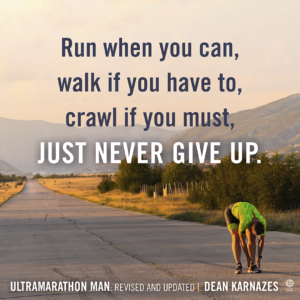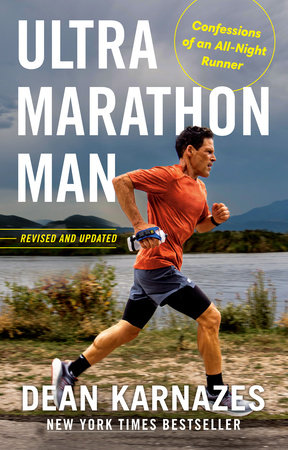 Ultramarathon Man: Confessions of an All-Night Runner helped introduce the world to ultramarathoning. Now, after three decades of running ultramarathons across the globe, Karnazes is still going strong. This updated and revised edition includes an afterword full of the lessons he’s picked up along the way.
Ultramarathon Man: Confessions of an All-Night Runner helped introduce the world to ultramarathoning. Now, after three decades of running ultramarathons across the globe, Karnazes is still going strong. This updated and revised edition includes an afterword full of the lessons he’s picked up along the way.
My earliest childhood recollection is running home from kindergarten. I remember sitting in class patiently waiting for the buzzer to ring. When it did, I swiftly made my escape. Outside the four walls of the school I was liberated. These were different times and the sight of a six-year old ambling merrily through the park alone was little cause for alarm. Running brought me an inner joy that nothing else in life rivaled. Class was about sitting and listing to how the world worked; running was experiencing it all firsthand. Nothing compared.
As the years passed, I continued running. Sometimes I ran with others, but mostly I ran alone. I’d never had a coach or belonged to a team until entering middle school—those notoriously tumultuous years when the bedrock you stand upon begins wobbling—and that’s when I encountered a man that would forever change my life.
Rumor was that as a young enlisted man, Jack McTavish could do more push-ups, sit-ups, and pull-ups than anyone in his platoon, officers included. And he could do them faster. Other recruits feared being paired with him; his strength and focus left them shamed. His approach to life was straightforward: he would rise earlier, train harder, and stay longer than anyone else. On those days when he didn’t feel like giving 100 percent, he forced himself to give 120.
This bullheaded drive and discipline served him well as a military man. But as my junior high school track coach, I found his approach intimidating. I don’t think many of the other students, or faculty members for that matter, quite knew what to make of him. It was Southern California in the seventies, and he was slightly out of place. The other teachers wore puka shells, tie-dyed
shirts, and long, scraggly hair. McTavish kept his hair in a tight crew cut. He wore the same outfit every day, regardless of the season or the setting: gray gym shorts, a perfectly pressed white V-neck T-shirt, and black midtop gym shoes. He always looked freshly shaven and neatly groomed. At five-feet-seven, one hundred fifty-five pounds, he was built as solidly as a tree trunk. There wasn’t an ounce of fat on the man. He was cut like an inverted pear.
Coach McTavish didn’t speak much, and when he did it was direct and to the point. Idle chatter was out of the question.
I met Coach for the first time outside the men’s locker room, where he was doing sit-ups on the concrete floor. He stood, gave me a crushing handshake, introduced himself while looking me squarely in the eyes, then got right back into the sit-ups, hardly missing a beat.
All of us on the track team were seventh- and eighth grade boys, but Coach always referred to us as men. There were two kinds of people in his view of the world: those he took orders from, and those he gave orders to. We were happy to obey.
Coach’s approach to running didn’t come out of any textbook; he simply instructed us to run as fast as we could until we crossed the finish line. Words of advice and encouragement were few and far between. His most frequent instruction to me was, “Go out harder.”
Once I tried to explain that if I started faster, I would have less kick left at the end. “Nonsense!” he replied. “Go out harder and finish harder.”
That was one of the few complete sentences Coach ever spoke to me. In two years, we probably exchanged fewer than fifty words. And of all the runners on the team, he spoke to me the most, as though I held some promise and could somehow do right by him.
He always had my full attention. There was something strangely appealing about his balls-to-the-wall training technique, and I came to respect, even enjoy, the practice of pushing my body to the brink of collapse. The theory was simple: Whoever was willing to run the hardest, train the longest, and suffer the most would earn the spoils of victory.
At the season-end California State Long-Distance Championship, a prestigious affair held on the legendary Mount Sac track, Coach issued his dictum: “Go out harder than those other chumps,” he said. And then he walked away.
All the other schools seemed to know what they were doing. Their runners wore matching, neatly tailored tracksuits that shimmered in the morning sun. They were doing wind sprints and stretches and quietly consulting with their coaches as though they were in complete control of the situation. Our school wore the same thing as Coach, gray gym shorts and white V-neck T-shirts.
I stood on that starting line, shivering with anxiety. I thought the other runners around me knew things I didn’t about how to train better and go faster. I was scared shitless. But the mile was my event. It was the longest race in junior high, and the most physically punishing. Even without a formal running strategy, I could endure more pain than anybody. That much I was sure of. No one, I was certain, had worked as hard as I had, or was willing to push as hard as I was about to push.
The gun went off and I did exactly as Coach had instructed: I went out as hard as I possibly could. I ran as though I were in a one-hundred yard dash rather than a one-mile race. The aggressive start put me immediately in the lead, and I maintained a blistering pace that broadened the distance between me and the rest of the pack as the race progressed. I ran faster and faster, and my lead increased further and further.
When I broke the finish tape in first place I was so focused that I kept right on running until I noticed that people were waving and yelling at me to stop. As I stood doubled over, trying to catch my breath, runners and coaches kept coming over to congratulate me. They said things like, “I’ve never seen anyone go out like that.” Clearly they were taken aback by my raw determination. It was more like complete tunnel vision.
Eventually, after everyone else had walked away, Coach casually strolled up.
“Good work, son,” he said. “How’d it feel?”
I was shocked. Coach had never asked me a question before.
“Well,” I answered slowly, “going out hard was the right thing to do. It felt pretty good.”
Coach kicked some dirt around with his foot. “If it felt good,” he said, squinting like Clint Eastwood, “you didn’t push hard enough. It’s supposed to hurt like hell.”
My dad got transferred and my family moved to another city a week after that race. Those were the final words Coach ever said to me, and I live by them to this day: If it comes easy, if it doesn’t require extraordinary effort, you’re not pushing hard enough: It’s supposed to hurt like hell.
Reprinted from Ultramarathon Man: Revised and Updated by arrangement with TarcherPerigee, an imprint of Penguin Publishing Group, a division of Penguin Random House LLC. Copyright © 2005, 2023, Dean Karnazes






